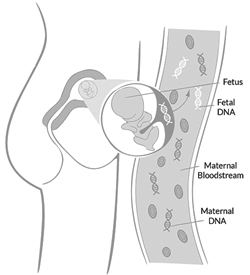A first trimester screening test will provide information on your risk of having a baby with one of the tested conditions.
The available screening tests include a first trimester blood test and an ultrasound (12-13 weeks). Together, these two tests form the Combined First Trimester Screen.
Alternatively, you may opt for a Non-invasive Prenatal Test (NIPT) and an ultrasound (13 weeks).
First trimester blood test
The first trimester blood test is taken between 9 weeks to 13 weeks and six days of pregnancy.
A sample of blood can be taken at any pathology collection centre. The blood is tested for the concentration of two hormones (free ꞵhCG and PAPPA) that change during pregnancy.
In a woman whose baby has a serious chromosome condition, the levels of these hormones will differ from normal levels.
Ultrasound
An ultrasound provides an image of your baby in the uterus. The ultrasound is performed between 12 weeks and 13 weeks of pregnancy.
The ultrasound allows a measurement to be taken of the thickness of fluid in an area behind the baby’s neck. This area, known as the nuchal translucency is often larger in babies with health conditions.
The ultrasonographer will measure the crown to rump length to check for growth and gestational age. This measurement is from the head (crown) to the bottom of the buttocks (rump) of the fetus.
In addition to genetic conditions, the ultrasound can also detect some physical abnormalities.
Combined First Trimester Screen
A computer program uses the results of the first trimester blood test and ultrasound nuchal translucency measurement – together with the mother’s age, weight and gestation of pregnancy – to provide risk assessments for chromosomal conditions.
This screening test is mostly covered by Medicare. The results should be available within 5 days and given to you by a doctor.
Non-invasive prenatal testing (NIPT)
The NIPT is a blood test which can be done from 10 weeks of pregnancy.
During pregnancy some of the DNA from the placenta crosses into the mother’s bloodstream. This DNA carries the baby’s genetic information, and this is what is analysed and measured in the mother’s blood.
The NIPT is more accurate than other screening blood tests for identifying pregnancies at risk for chromosome conditions. It can also determine the sex of the baby and babies with sex chromosome abnormalities.
There are extra conditions that can be detected by NIPT, and the cost of the test may differ depending on the number of screened conditions. Discuss with your doctor or midwife if it is appropriate for you to test for the extra conditions. The accuracy of results for these extra conditions is lower than the common chromosomal conditions. The ability to accurately detect conditions is reduced in multiple pregnancies.
NIPT is not covered by Medicare so there will be an out of pocket cost for it.
If you decide to go with NIPT, the ultrasound is performed at 13 weeks of pregnancy, after you have received your NIPT test results.
Figure 1: Non-invasive prenatal testing of fetal DNA
